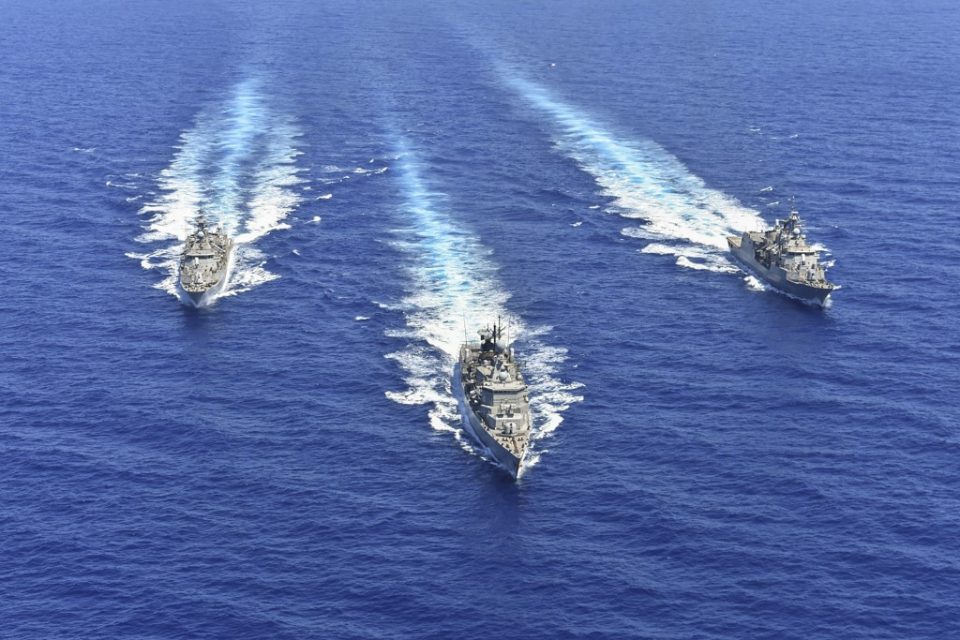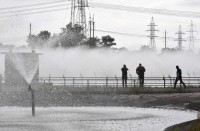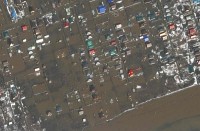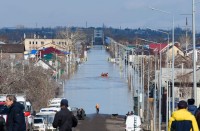
by Hélène COLLIOPOULOU with Raziye AKKOC in Ankara
ATHENS, Greece (AFP) — Greece and its EU allies held war games in the Mediterranean Wednesday while Turkey conducted drills with the US navy nearby, as the row between the two neighbours over gas and maritime borders ratcheted up another notch.
The convergence of a growing number of warships on an energy-rich but disputed patch of sea between Cyprus and Crete came as NATO and a host of European officials called for cooler heads to prevail.
Greece and Turkey are ancient rivals with a litany of disputes — despite both being members of the NATO military alliance.
They nearly went to war over some uninhabited islets in 1996, and earlier this months frigates from the two sides collided while Turkey was searching for energy in the eastern Mediterranean.
The threat of another conflict could imperil Europe’s access to a wealth of new energy resources and draw in nations such as Egypt and war-torn Libya.
NATO Secretary General Jens Stoltenberg said he was “personally regularly in contact with Ankara and Athens”.
‘Catastrophe’
After failed shuttle diplomacy aimed at getting the two sides talking again Tuesday, Berlin on Wednesday criticised the naval exercises as “not helpful”.
The emerging crisis is quickly rising to the top of the agenda not only regionally but also in Brussels and Washington.
Greek Prime Minister Kyriakos Mitsotakis said after telephone talks with US President Donald Trump that Athens was “ready for a significant de-escalation — but on condition that Turkey immediately stops its provocative actions”.
But Turkish President Recep Tayyip Erdogan insisted Wednesday that Ankara would not accept preconditions such as suspending its gas exploration before resuming dialogue.
Turkey will “make no concessions on that which is ours,” Erdogan said.
Greece was able to secure the support of EU military powerhouse France in three days of war games starting Wednesday that also include Italy and Cyprus.
The Turkish defence ministry conducted its own drills with an Italian navy vessel on Tuesday.
And the same US destroyer that took part in the exercises with Turkey had staged air and sea manoeuvres with the Greek navy south of Crete on Monday.
The seeming shifts in allegiance highlight Rome and Washington’s desire to avoid challenging Erdogan because of Turkey’s importance to conflicts in Libya and the Middle East.
But France has joined Greece in shadowing the Turkish vessels and is openly warning Erdogan against overplaying his hand.
The Mediterranean “should not be a playground for the ambitions of some — it’s a shared asset,” French Defence Minister Florence Parly said.
EU split
Simmering tensions began bubbling over when Turkey sent the Oruc Reis research vessel accompanied by warships into disputed waters on August 10.
Greece responded by dispatching its own navy ships to show its displeasure and keep an eye on Turkey’s work.
But Turkey says this latest conflict really started on August 6, when Greece struck an exclusive economic zone agreement with Egypt that conflicted with Ankara’s maritime claims.
That pact was agreed after Turkey delayed the Oruc Reis mission to give diplomacy another chance in July.
Erdogan re-ordered the disputed exploration immediately after the Egypt deal.
Greece is expected to once again push for penalties against Turkey at an informal meeting of EU foreign ministers in Berlin on Thursday and Friday.
Turkey has been isolated at such meetings because it is a member of NATO but not the EU bloc.
Its accession talks to the EU have stalled as Erdogan pushes ahead with a more nationalist and diplomatically aggressive course that plays well to his conservative base at home.
But the EU has refrained from heavily sanctioning Turkey and has only targeted two energy executives for their role in drilling work near Cyprus.
In past disputes, Erdogan has repeatedly used the threat to open Turkey’s borders and allow millions of refugees — many of them from Syria — to enter the EU.
“If we say we will do something, we will do it, and we will pay the price,” he said Wednesday.
© Agence France-Presse







